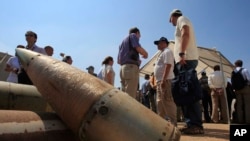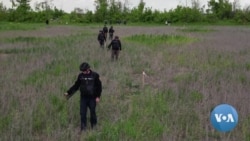Southeast Asian countries are warning about the long-term dangers of cluster bombs in Ukraine after the United States sent the explosives to Kyiv earlier this month for use in their drive to recapture territory seized during Russia’s invasion.
Russia has been documented using cluster bombs against Ukraine since the beginning of its invasion. Ukraine asked Washington for the munitions, which break apart in midair and scatter smaller explosives, to target Russian troops on its territory.
But Cambodia and Laos experts say cluster munitions should never be used because some of the small bomblets fail to explode and remain deadly for decades.
From 1964 and 1973, the height of the Vietnam War, Laos was the victim of intense U.S. bombing campaigns, becoming the most heavily bombed country in the world per capita.
The raids included an estimated 250 million cluster munitions, about 30% of which failed to detonate upon impact, leaving many of them strewn across broad swaths of territory with the latent potential to explode unexpectedly.
Titus Peachey, a member of the U.S. Campaign to Ban Landmines Steering Committee, spent over five years in Laos between 1981 and 1994.
“These weapons cover a wide area and are difficult to target precisely,” he told VOA.
“Many fail to detonate on impact but can still remain lethal … for decades,” he said. “Unexploded ordnance makes everyday activity risky. Farmers in Ukraine will have to farm at their own peril until the bombs can be found and destroyed. Clearance work is expensive, painstaking, and tedious.”
In a rare statement earlier this month, the Laotian Foreign Affairs Ministry urged any state to refrain from use of any cluster munitions.
"As the world’s largest victim of cluster munitions and a state party to the Convention on Cluster Munitions, the Lao People's Democratic Republic expresses its profound concern over the announcement and the possible use of cluster munitions," the statement said.
The Convention on Cluster Munitions is an international treaty of more than 100 international state parties, including Laos, that came into force in 2010 to prohibit all use, production, transfer and stockpiling of cluster munitions. Russia, Ukraine and the United States did not sign the treaty.
“The position of the Lao government takes a moral stand, in that it not only wants to prevent the transfer of munitions to Ukraine, but to encourage other state actors to prevent the production and the stockpiling of these weapons,” said Mark S. Cogan, associate professor of peace and conflict studies at Kansai Gaidai University.
“In the case of Laos, there is credibility in its early adoption of the convention, ratifying it very early, back in 2008,” he told VOA. “I attribute that to intergenerational trauma, where the lasting consequences of these munitions not only affect those born during and immediately after the war, but the psycho-social effects linger.”
Although there is no war in Laos today, the country’s 7 million population still lives in fear of more casualties.
According to demining group Mines Advisory Group, more than 50,000 people have been killed by unexploded bombs in Laos, 20,000 of those since the Vietnam War ended in 1975.
Shui Meng, wife of renowned Lao activist Sombath Somphone, who disappeared in 2012, has lived in Laos for over three decades. She believes the small munitions will remain a threat for decades to come.
“I don't think Laos will ever be cleared,” she told VOA. “The bombing has been so widespread, and I think the country would have to live with this for a long time and maybe forever.”
Cambodia
After almost three decades of civil war ended in 1998, the Cambodian countryside was left littered with an estimated 4 million to 6 million pieces of unexploded ordnance, according to demining advocacy groups.
Cambodian Prime Minister Hun Sen, who recently won Cambodia’s 2023 general elections, called for the cluster bombs not to be used. He spoke of “Cambodia’s painful experience” and said cluster bombs represent “the greatest danger for Ukrainians.”
Cogan found that stance surprising. Despite being one of the most land-mined countries in the world today, Cambodia has still not acceded to the Convention on Cluster Munitions.
“While Cambodia doesn’t have the same record of activism against cluster munitions as Laos, it is no less of a victim, which also traces back to its bloody conflict between the Khmer Rouge and the government of Cambodia,” Cogan said.
“I find it odd that Cambodia has urged countries to avoid the use of cluster munitions, but has long delayed joining the convention, even though it is a party to both the land mine treaty and the Convention on Conventional Weapons.”
Cambodia has cited security related reasons for its decision not to join the convention.
From 1979 to 2022, more than 65,000 people were injured or killed by unexploded bombs in Cambodia, according to the Cambodian Mine Action and Assistance Authority as reported in the Phnom Penh Post.
Chhengpor Aun, a visiting fellow at the International Institute for Strategic Studies who focuses on Cambodian politics, said Hun Sen has been personally affected by the munitions.
"Mr. Hun Sen himself was a former anti-West fighter in Cambodian civil war, a survivor of American bombing of Cambodia, unlike many who could not make it, and later a leader of one of the world's most mined and bombed countries,” he told VOA. “To him, this is personal.”
Meas Nee, a Cambodian political commentator and critic of Hun Sen, agrees with the prime minister.
“We are from a country where we suffer from the war and particularly the eyewitness of the danger of the cluster bomb,” he told VOA. “We don't want to see this used elsewhere.”
Biden administration national security adviser Jake Sullivan told CNN earlier this month that the White House decision to provide Ukraine with cluster munitions is a stopgap measure to alleviate a shortage of 155 mm artillery shells.
President Joe Biden said he based his decision on the "recommendation of the Defense Department to, not permanently, but to allow for this transition period, while we get more 155 weapons, these shells, for the Ukrainians.”
The U.S. decision to use the controversial ordnance drew immediate criticism from domestic and international human rights groups, along with some congressional lawmakers.
Supporters of the decision, however, have said cluster munitions are already being used in Ukraine, primarily by Moscow but also by Kyiv. Ukrainian forces have pledged to confine their deployment to non-civilian areas and track their use for postwar cleanup operations.
White House national security coordinator John Kirby told reporters that Ukraine is already using the cluster munitions “effectively.”










